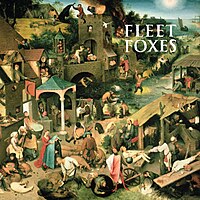
Band: Fleet Foxes
Album: Fleet Foxes
Best song: "Ragged Wood" is fun. "Sun it Rises" is a great opener.
Worst song: "Meadowlarks" isn't particularly good.
Requested by a friend, my opinions on this record are far too late. Fleet Foxes was the most critically acclaimed album (non-Tha Carter III division, of course) of 2008. Pitchfork named it the top album of 2008. It's one of the records that has kept Sub Pop relevant, critically and financially. The band has appeared in festivals and on Saturday Night Live. Almost everyone agrees, this album is amazing.
It's not to say that I disagree; Fleet Foxes is a great, great record. Meticulously produced and arranged, the record is lofty and pretty. It's full of appegiated guitars and layered vocals and...
Well, that's it. The vocals are the driving force in the record. For all the band's skill at constructing Love-esque soundscapes, the vocal style is what sets Fleet Foxes apart.
This is not always a good thing. The band's harmonies get very old by the end of the record, but in each individual song sound lovely and moving. Vocals, all too often, are meant to convey message, whereas the Fleet Foxes use vocals as an additional intrument.
---
Maybe I'm just promoting my own time to important status, but it seems like the postmodern world is becoming increasingly obsessed with nostalgia. We seem to be so tired of modernity that anything echoing something old is seen as attractive.
There are scores of Web sites -- run by women -- promoting Mad Men's protaginist Don Draper as the perfect man, largely because he's uncommunicative, philandering and tortured. There's no question that the modern man is not perfect and the 2009 idea of masculinity is no great thing, but the 1950s man was, um, not great. But, it's old and therefore, must have been better.
Indeed, Fleet Foxes and Mad Men are good analogues. Each is considered the best of its medium and are so overhyped that actual interaction left me disappointed. In another, less-hyped world, I probably would've loved this record and that show. But, instead, I find myself thinking "well, it wasn't as good as I was told."
Fleet Foxes has tinges of Summer of Love sounds in it. The folk of "Ragged Wood" is pleasant, but hardly forward-thinking. It could easily double as something from the back end of the Nuggets box or a Zombies record.
That's not to say it's bad; it isn't. "Ragged Wood" is amazing and the best song on the album. But, it's not super interesting. Just because Fleet Foxes' influences are 40 years old doesn't make them so much better than, say, Band of Horses (influenced by bands from 10 years ago). Fleet Foxes likes the better Grateful Dead records, Phish likes the crappy ones. I could go on.
Nevertheless, Fleet Foxes remains an excellent collection of music. The album opener builds as well as any record. For a folk band, it drives strongly and showcases that vocal style. "Quiet Houses" has an almost circular guitar line that builds into another vocal breakdown/acoustic guitar thing. The single, "White Winter Hymnal" keeps a pretty boring midtempo beat the entire song, borrowing a the shuffle from the Shins' "New Slang." "Blue Ridge Mountains" has the band working a more subdued place, with sparse drums eventually building to a timpani-sounding expanse by the end of the song.
There are colors of the past everywhere. The album artwork reminds one of a renaissance painting. The original Pitchfork review -- mistakenly, I'd say -- mentions that one song " could be a field recording sung by a small-town congregation 50 years ago." That's not attractive to me, but the stilted drums on "He Doesn't Know Why" move the song along as well as a record with more modern influences.
Like Mad Men, the hype is mostly deserved. It's a lovely record, but best taken in small doses.


1 comment:
I'm glad someone else didn't think Mad Men lived up to the hype.
Good show? Yes. But life-changing? No.
Maybe I just need to give it more time, but my first reaction was, "THIS is what all the fuss was about?"
Post a Comment